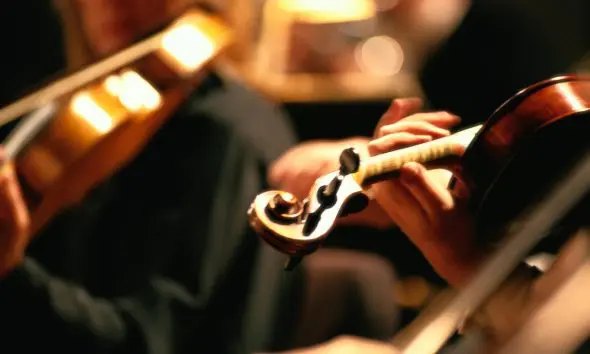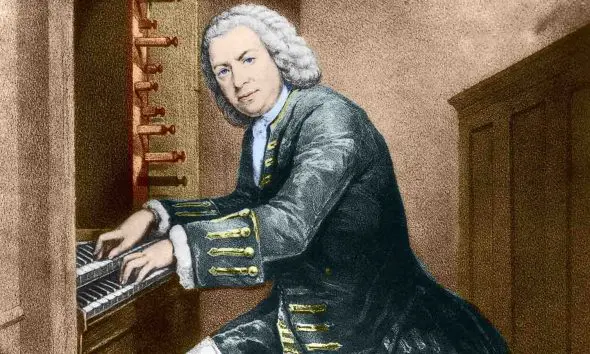Best Classical Music For Thanksgiving: Top 10 Pieces
Discover our selection of the best classical music for Thanksgiving including masterpieces by Beethoven and Copland.

Whether it is music for Thanksgiving Day in America, thanksgiving for a good harvest, thanksgiving for the many blessings in our lives or thanksgiving simply for the beauty of the earth and our surroundings, composers down the centuries have used the power of music to express our feeling of collective gratitude (just as they have been inspired to write music that consoles and comforts at other times). Scroll down to discover our selection of the best classical music for thanksgiving featuring ten very different ways in which classical composers have achieved this. Of course, this is a classical music collection – but we can still join hands with the pop world and say with Abba “Thank you for the music”!
10: Thou Visitest the Earth – Greene
One of the loveliest anthems for Harvest Thanksgiving is by the English composer Maurice Greene (1696-1755). Thou Visitest the Earth, one of the best pieces of classical music for Thanksgiving, is a setting of lines from Psalm 65: ‘Thou visitest the earth, and blessest it; and crownest the year with thy goodness …’ That is the complete text, sung first by the tenor solo, repeated and then taken up with delightfully airy harmonies by the chorus.
Greene, the London-born son of a clergyman, is one of those ‘missing link’ composers. Having become a choirboy at St Paul’s Cathedral under Jeremiah ‘Trumpet Voluntary’ Clarke, he became organist there before moving to the Chapel Royal and becoming professor of music at Cambridge University. In 1735 he was made Master of the King’s Musick – one of the least remembered names in the post (he was followed by the better-known William Boyce). Greene’s best-known anthem is Lord, Let Me Know Mine End, sung by every cathedral choir in the land. He is buried in St Paul’s Cathedral.
9: A Hymn of Thanksgiving – Lloyd Webber
William Lloyd Webber was appointed organist and choirmaster of All Saints Church, Margaret Street, in the West End of London, in March 1936. He had become a Fellow of the Royal College of Organists at 19 and gained his doctorate at 24. He was one of the many composers of that era who became increasingly convinced that his own music was out of step with the prevailing climate of the time. It was to his credit that he stuck to what he liked and did not regard ‘tune’ as a four-letter word. The distinguished critic John Steane wrote of Lloyd Webber that ‘listening to his music is simple enough in many respects but hampered by associations – one is always saying “What’s that?” as a familiar progression tantalises the memory.’
But who could fail to respond to this heartfelt hymn by “a minor but gifted composer who was so out of line with trends in the 20th century” (Steane again). Lloyd Webber’s two famous sons would surely approve!
8: Te Deum in B Flat – Stanford
The Te Deum is often referred to as a Hymn of Thanksgiving. The words Te Deum laudamus (‘We praise thee, O God’) have been traditionally attributed to Saints Ambrose (it has often been called an Ambrosian Hymn) and Augustine from the latter part of the 4th century. It was more likely written by St. Niketas, bishop of Remesiana in about the same time period. It is still part of the Liturgy of the Hours, the public prayers of the Church that are recited daily by the clergy, along with many of the laity as well. The text combines important elements of prayer to God, including adoration, supplication (particularly towards the end in its appeal for God’s mercy), and thanksgiving.
The words have been set to music by countless composers over the centuries. Among the most powerful – and most widely-sung as far as the Anglican church is concerned – is this rousing version by Sir Charles Villiers Stanford (he himself provided seven different settings of the text over the years).
7: But Thanks Be To God (Messiah, Part 3) – Handel
Part 1 of Handel’s mighty, miraculous oratorio Messiah, one of the best pieces of classical music for Thanksgiving, composed in 1741, begins with the prophecy of the Messiah and his birth. Part 2 concerns the Passion, death, resurrection and ascension. Part 3, from which this chorus comes, concentrates on St Paul’s teaching of the resurrection of the dead and Christ’s glorification in heaven. This final section begins with the famous soprano solo ‘I know that my redeemer liveth’, closely followed by the bass solo ‘The trumpet shall sound’. ‘But thanks be to God’ is sung by the full chorus, a curtain raiser for the even more magnificent concluding number ‘Worthy is the Lamb’.
6: Nun Danket Alle Gott – Karg-Elert
I doubt if one in a hundred people could tell you the author and composer of one of the most popular of all thanksgiving hymns. The music is attributed to Johann Crüger (1598-1662), a German composer of hymn tunes, published in about 1647; Martin Rinkart (1586-1649), a Lutheran pastor, wrote the words, familiar in their 19th century translation as ‘Now Thank We All Our God’.
Jump forward to the 20th century and we find in 1910, a volume of 66 Chorale Improvisations Op. 65 for organ by the German composer Sigfrid Karg-Elert (1877-1933). No. 59 is an organ improvisation on the tune of Now Thank We All Our God, but cleverly concealed in its barn-storming, rhapsodic treatment of the tune. No wonder it is so popular with organists: it is concise, avoiding the meandering of some of the composer’s other works; it lies well under the hands and feet; and it makes a terrific impact with audiences.
Apart from Karg-Elert’s Flute Etudes, of his 158 works with opus numbers and a further 90 without, this is the only work of the composer that retains its place in the standard repertoire.
5: For the Beauty of the Earth – Rutter
The splendidly-named Folliott Sandford Pierpoint (1835 –1917) wrote the words of what is one of the most frequently-sung thanksgiving hymns. He was born in Bath, England (and indeed spent most of his life there) and it is that city and the glorious countryside surrounding it that is said to have inspired the poem which he wrote in 1864 aged just 29. There are several alternative tunes to which it is sung, perhaps the most familiar of which is Dix (named for its composer William Chatterton Dix) to which is also sung the carol As With Gladness Men of Old. But for choirs, it is the setting by John Rutter composed in 1978 that takes pride of place. There are recordings of it with small orchestra, organ or piano and arrangements for several different choral forces. The first was made by the composer with The Cambridge Singers in 1983. Rutter’s For the Beauty of the Earth has quickly established itself as a choral classic and is one of the best pieces of classical music for Thanksgiving.
4: Variations on a Shaker Hymn (from Appalachian Spring) – Copland
For many Americans, the Shaker dance song ‘Simple Gifts’ is the ultimate song for Thanksgiving. The Shakers, as they were known, were a radical Christian sect whose official title was the United Society of Believers in Christ’s Second Appearing. Originally founded by the Quakers back in the 1740s, they earned their familiar name because of the shaking and trembling of their ecstatic dancing.
The tune of ‘Simple Gifts’ is most famous musically in Aaron Copland’s orchestral masterpiece, Appalachian Spring, the ballet score he composed in 1944-45 for the renowned dancer and choreographer Martha Graham. The work is a tonal portrait of Pennsylvania farmland. The penultimate section (No. 7) of the orchestral suite is entitled ‘Scenes of Daily Activity for the Bride and her Farmer-Husband’. The music is a set of variations on the tune of ‘Simple Gifts’. Many in the UK and beyond use the same tune to sing the hymn ‘The Lord of the Dance’ (‘Dance, then, wherever you may be / I am the Lord of the Dance, said he’) written in 1963 by Sydney Carter.
3: Thanks Be To God (from Elijah) – Mendelssohn
Mendelssohn had the idea of composing a choral work about the prophet Elijah in 1836, soon after he had completed his first oratorio, St Paul. In fact, it did not come to fruition for another decade when the Birmingham Music Festival invited him to compose a work for that year’s event. The first performance, which took place in Birmingham Town Hall with the composer himself conducting, was an overwhelming success and in the UK, for over a century, Elijah was second only to Handel’s Messiah in popularity when it came to great oratorios. Among its many famous solos, duets and choruses are ‘O rest in the Lord’, ‘If with all your hearts’, ‘Hear ye, Israel’, ‘Baal we cry to thee’ and this stirring chorus, based on the words of Psalm 93, with which the first part of the oratorio ends:
‘Thanks be to God,
He laveth the thirsty land!
The waters gather, they rush along; they are lifting their voices!
The stormy billows are high; their fury is mighty.
But the Lord is above them, and Almighty!’
2: Give Me Your Tired – Berlin
This uplifting song is one of those numbers that fall between the classical and the popular. In fact, it comes from a 1949 Broadway musical, Miss Liberty, which had a book by Robert E Sherwood and music by the great Irving Berlin.
Set in 1885, the flimsy plot revolves round New York Herald publisher Jamie Gordon Bennett assigning novice reporter Horace Miller to find the woman who served as the model for the Statue of Liberty. The final number is Berlin’s superb setting of the words on the base of the Statue by written by Emma Lazarus, placed there in 1903:
‘Give me your tired, your poor,
Your huddled masses yearning to breathe free,
The wretched refuse of your teeming shore.
Send these, the homeless, tempest-tossed to me,
I lift my lamp beside the golden door!’
Berlin was convinced this exultant expression of hope and thanks would become America’s new national anthem and was bitterly disappointed when it did not catch on in the way he had hoped. In the spine-tingling the recording by the Mormon Tabernacle Choir under conductor Eugene Ormandy, you almost wish he had succeeded.
1: Shepherd’s Thanksgiving (from Symphony No. 6 ‘Pastoral’) – Beethoven
According to Beethoven’s companion Charles Neate, “Nature was almost meat and drink to [him]; he seemed positively to exist upon it.” The ‘Pastoral’ Symphony, regularly voted the most loved of all Beethoven’s compositions, is a hymn to Nature which originally bore the title ‘Characteristic Symphony: The recollections of life in the country’. The descriptive titles of its five movements were all added later – ‘The Awakening of Joyful Feelings Upon Arrival in the Country’, ‘Scene by the Brook’, ‘Merry Gathering of Country Folk’, ‘Thunder – Storm’, and ‘Shepherd’s Song – Cheerful and Thankful Feelings after the Storm’.
The Symphony, one of only a few of Beethoven’s works to have an explicit programme content, was sketched in 1802 but not completed till six years later. It was written in tandem with the Fifth Symphony and first performed in the same over-ambitious, under-rehearsed concert in Vienna’s Theater an der Wien on 22 December 1808.




